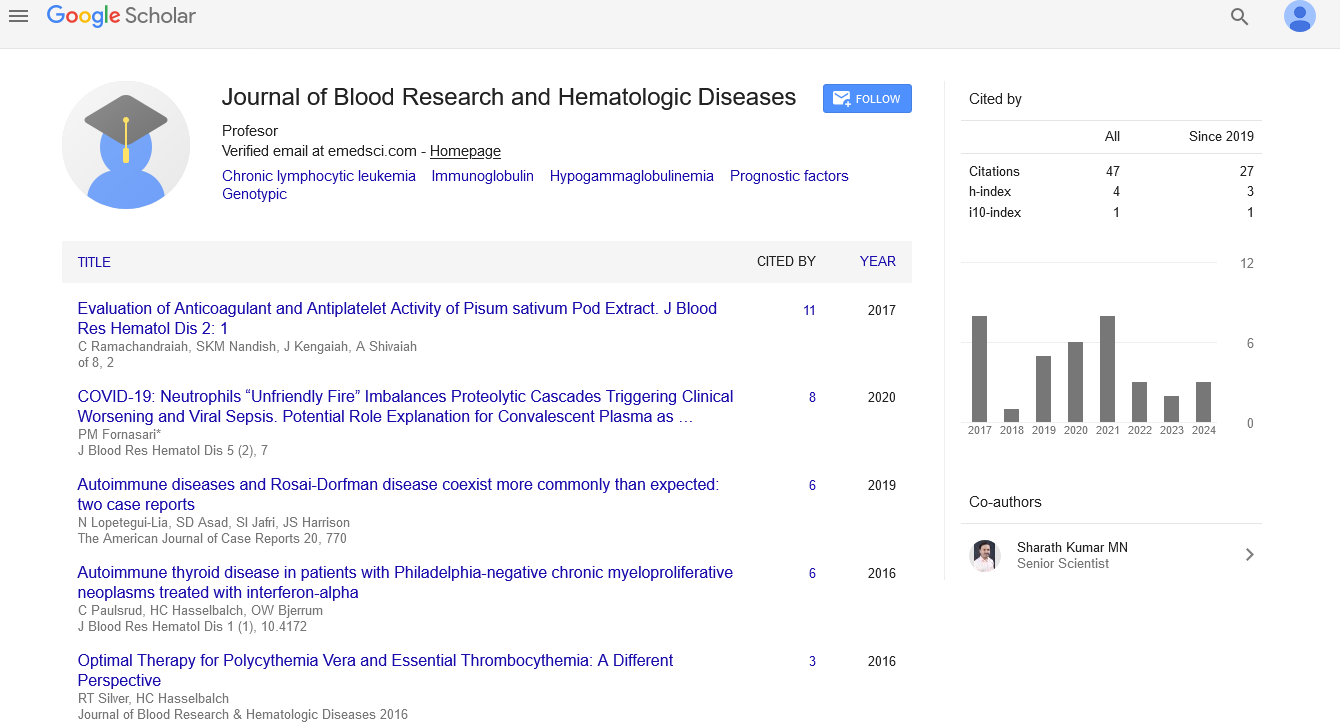Perspective, Jbrhd Vol: 6 Issue: 4
Study of the relation between Egyptian patients with hepatocellular carcinoma and the genetic variations in DNA repair genes
Eirik Tjonnfjord
Karolinska University Hospital, Sweden
Abstract
Paroxysmal nocturnal hemoglobinuria (PNH) is a rare aquired hematopoetic stem cell disorder characterized by the triad of intravascular hemolysis, thrombosis and bone marrow failure. The symptoms are caused by complement activation on the cell surface of hematopoetic cells. The detection of a PNH clone is made by analyzing GPI-anchored molecules on blood cells by flowcytometry. The only curative treatment, allogeneic stem cell transplantation is limited by short- and long-term consequences, and donor availability. Eculizumab, a humanized monocolonal antibody against terminal complement protein C5 is currently the most effective treatment.
Abstract:
Paroxysmal nocturnal hemoglobinuria (PNH) is a rare aquired hematopoetic stem cell disorder characterized by the triad of intravascular hemolysis, thrombosis and bone marrow failure. The symptoms are caused by complement activation on the cell surface of hematopoetic cells. The detection of a PNH clone is made by analyzing GPI-anchored molecules on blood cells by flowcytometry. The only curative treatment, allogeneic stem cell transplantation is limited by short- and long-term consequences, and donor availability. Eculizumab, a humanized monocolonal antibody against terminal complement protein C5 is currently the most effective treatment.
Development of modern flow cytometric techniques have improved diagnostic accuracy and created possibilities for follow-up of small clones. Correct estimates of incidence and prevalence are of importance also health economically.
The Nordic countries have a unique system of record data bases and centralization of diagnostics to a few centers which allows characterizing incidence and prevalence accurately. Our aim is to describe PNH clones detected over a period of 6 years by flow cytometry in Denmark (Den), Finland (Fin), Norway (Nor), and Sweden (Swe).
Methods:Data was collected from the Stockholm and Gotland regions in Sweden, Copenhagen region in Denmark, Oslo region in Norway and from Finland. All laboratories used accredited methods. The study population included all patient samples referred to the laboratories for PNH testing between 2011 and 2016. We included all newly detected PNH clones in neutrophils between 0.1-100% in the study.
Results:The mean incidence of newly detected PNH clones between 0.1 and 100% was 2.33 per year and million inhabitants in the Nordics. of all newly diagnosed PNH clones, 41% were 50%. The mean age at
detection of the clone was 52 years (6 to 90 years). PNH clones were evenly distributed between age groups, and there was no gender difference.
Conclusion:This is the first study to report incidence of PNH clones in the Nordic countries, which is higher (2.33/ million) than previously reported in other countries (1.3/million). In the Yorkshire data only 18% of the PNH clones were <1% compared to 41 % in our material. This may reflect increase in testing for PNH clones in patients with aplastic anemia, myelodysplastic syndrome or other conditions associated with PNH, or more sensitive modern
laboratory methods. In the Finnish data 49% of the patients had a clone <1% compared to 28%, 38% and 39% in Denmark, Norway and Sweden, respectively. This may explain the seemingly higher incidence of PNH clones in Finland. Our study has given an estimate of PNH incidence in the Nordic countries and important information for further health economical studies.
Biography:
E Tjønnfjord took his Degree at Odense University Hospital, Denmark. He has worked in the field of hematology with a special interest in the benign hematology. He is now starting a PhD focusing on the treatment of ITP and how to improve it.
